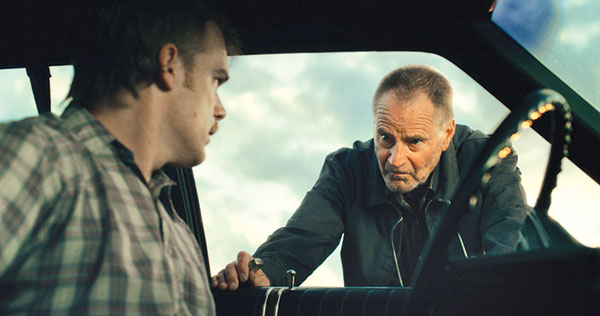It’s nigh on impossible to discuss the plot of Cold in July without veering into spoiler territory. But in the interest of context, let’s give it a go. In the course of a middle-of-night home invasion, gun-shy picture framer Richard Dane (Michael C. Hall) shoots and kills an intruder. Dane is hailed as a hero by the local sheriff and townsfolk, but the act of self-defence weighs heavily on his conscience. It also brings his family to the attention of the burglar’s psychotic father, Ben Russell (Sam Shepard), fresh out of prison and intent on avenging his son.
What starts as a straightforward revenge thriller then begins to weave a serpentine path through multiple genres, touching on conspiracy drama, American gothic, film noir and vigilante action film. Director Jim Mickle has drawn inspiration from Night of the Hunter, Blood Simple, Cape Fear (both versions) and Badlands. While Cold in July doesn’t match up to any of these masterpieces, it’s never afraid to try something fresh.
Mickle’s fourth film (and first venture outside of the horror genre) changes gears more times than Bradley Wiggins on the Tour de France. The script, adapted from Joe R. Lansdale’s novel, is nowhere near as gloriously bonkers as Don Coscarelli’s Bubba Ho-Tep, and the constant changes in pace sometimes make for a slightly uneven and unsatisfying experience. The motivation of mild-mannered Dane becomes increasingly nebulous the further we go. After the third or fourth narrative shift Hall (in a heroically bad mullet-and-leather-waistcoat combo) plays out the film by furrowing his brow for reasons unknown. Don Johnson (who is increasingly coming to resemble a Kevin Costner tribute act) is stunt-cast as a pig-farming private detective used mainly for light relief, and some of the over-stylised slow-mo shots veer dangerously close to cheeseville. However, Shepard is utterly convincing as Russell, a brooding powder keg hell-bent on vengeance, and special mention must go to Jeff Grace’s throbbing musical score. The synth-heavy soundtrack is reminiscent of some of John Carpenter’s better work during the 1980s, and amps up the tension to great effect. Cold in July never tries to disguise its B movie credentials. It’s no classic, but it’s a noble attempt at narrative experimentalism that will keep you on your toes.

